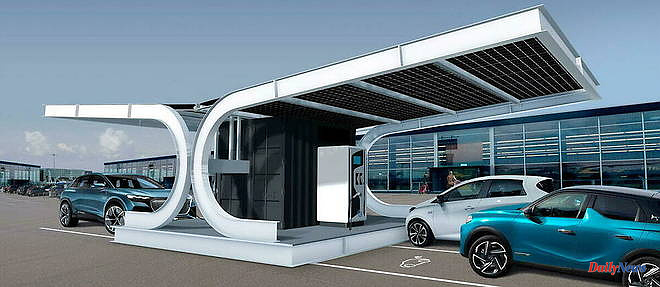We finish the horses well. Despite going it alone on this radical change that it imposes on itself, the EU took a big step on Tuesday towards the end of gasoline and diesel vehicles, confusing the latest generations made very clean with the previous ones that emit high levels of pollutants. MEPs put all thermal cars in the same bag and approved the end of sales of these new models from 2035. Not content with this witch hunt, Brussels then presented its next objectives for buses and trucks.
"We have reached a historic agreement, which reconciles the automobile and the climate, two enemy brothers," said environmentalist MEP Karima Delli, chair of the Transport Committee in the European Parliament. MEPs have largely adopted, with 340 votes for, 279 votes against and 21 abstentions, the new regulations providing for reducing CO2 emissions from new cars and vans in Europe to zero from 2035.
This amounts to the de facto cessation of sales of new petrol and diesel cars and light commercial vehicles in the EU on this date, as well as hybrids (petrol-electric), in favor of 100% electric vehicles.
Proposed by the European Commission in July 2021, the text was the subject of an agreement last October between the Member States and the negotiators of the European Parliament after tough negotiations. It is this agreement which was approved by MEPs on Tuesday, and the Council (body representing the States) must still formally give the green light for the text to enter into force. Which no longer seems to be in doubt.
While the car, the first mode of transport for Europeans, represents just under 15% of the continent's CO2 emissions, the new regulations must enable the EU to achieve its climate objectives: reduction of greenhouse gas emissions greenhouse by 55% by 2030 compared to 1990 and carbon neutral by 2050.
But the vote also made people cringe. The EPP (right), the main political formation in Parliament, defended a reduction in emissions from new cars by 2030 of 90% rather than 100%, fearing too great a destabilization of the automotive sector, with around 13 million jobs in Europe.
The radical left (The Left) is alarmed by a text making Europe "dependent on battery components from China and Africa", in the words of Czech communist Katerina Konecna.
Chance of the calendar, shortly after Parliament's vote on cars and vans, the European Commission unveiled its proposals on Tuesday to regulate heavy vehicles (trucks, buses, etc.), which generate 6% of greenhouse gas emissions in the EU. EU.
For trucks sold from 2030, emissions should be cut by at least 45% "on average" from 2019 levels, then slashed by 65% from 2035, and 90% from 2040 , according to this text which will be negotiated between States and MEPs. Exemptions are provided for certain vehicles (firefighters, police, army, ambulances, etc.). Brussels also wants all new buses put into service in European cities from 2030 to be "zero emissions".
"To achieve our climate goals, all parts of the transport sector must actively contribute", so that by 2050, "virtually all vehicles on our roads will be zero emissions", stressed Frans Timmermans, Vice President of the Commission. "Our industrialists are preparing for this," he said. According to him, heavy goods vehicles, which currently run on diesel or gasoline, will be able to run on hydrogen, via fuel cells or modified combustion engines, but also on electricity. A purely theoretical opinion which ignores the exorbitant cost of these technologies and the logistical problems related to the distribution of hydrogen.
German automaker Daimler and rival Volvo are planning mass production of hydrogen fuel cells for trucks as early as 2025, and long unimaginable electric trucks are "starting to arrive," Timmermans said.
But he also acknowledged that it was a true "industrial revolution" for the sector, taking up the "daunting challenge" of producing "green" electricity or hydrogen to power this fleet of heavy trucks. clean.
The 2030 target "means more than 400,000 zero-emission trucks will be on the road, with 50,000 public truck-friendly charging points operational within seven years […] not including some 700 hydrogen charging stations “Said the Association of European Automobile Manufacturers (ACEA).
With this truck-specific infrastructure "almost totally lacking today, the challenge ahead is enormous," she insists.
The environmental NGO Transport












